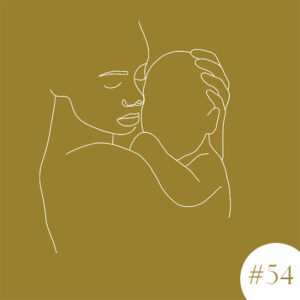September 5, 2023

I’m currently in Salt Lake City enjoying an early morning cup of tea in my firstborn’s new home. Awestruck as the sun paints the mountains metallic gold, then soft pink, then a whole palette of gray-blues, I’m grateful to have this time before my girl (28 years old already, somehow) and her boyfriend (also part of the family) are awake. My heart is insistent on lots of time for quiet and reflection these days given all the changes and tender transitions I’m navigating (their moving away is among a heavy handful of them).
My nest isn’t entirely empty yet; I still have two years until my youngest flies. But given that she’s as extroverted as her father (who has her in his nest half the time) and that she now has a car, let’s just say that quiet is more accessible to me than it’s ever been.
Which is both glorious and heart wrenching.
I became a mother at 17 years old, which means that until now, I’ve never known this kind of quiet. Or not for long stretches, anyway. I craved it hard when my girls were young, but experienced it only if and when I was willing to trade it for sleep. That is a brutal, cruel trade, and one that makes me see red every time I reflect on those years and the millions of mothers whose life-force energy is drained whichever option they choose.
Sleep or quiet but not both? Fuck villagelessness and fuck patriarchy. If those were men’s only two options, they’d never have done away with villages to begin with. Boiled blood-red, I tell you.
What just happened there is a good example of grief’s messy presence in my life these days. It often starts with tender gratitude for an attunement to beauty (the mountains, the gold, the presence of my sleeping family, the bergamot in my earl gray), then moves quickly into reflections on the passage of time, then morphs into rage over some injustice or another. Then I’m back to tenderness again, because life is so damn short and the leaves are starting to fall and dear god, that gold on the mountains.
Plus I only have two days here to help them move in and then begins the work of loving them from afar, for a time. And how’s my sweet college freshman fairing? And 150-300 chinchillas are killed to make one fur coat (I just learned). Oh, but the Douglas firs are swaying, soft and gentle, so up well the tears again.
I’ve been working with and catching the stories of mothers since 2004. In my observation, the thickest threads running through our collective story and shared experiences, by far, are love, overwhelm, and grief. Amidst all the busyness, just beneath the overfunctioning, and right there under the surface of every baby cuddle, every witnessed “first,” and every prayer-for-their-safety-accompanied goodbye, grief is with us, whether we know it by name or not.
Here’s the thing that’s so easy to forget in our youth-worshiping culture:
Grief is the lifeblood of most rites of passage.
Grief is a requisite for becoming a true elder.
Grief is essential to our collective maturation.
Because we also live in a perfection-and efficiency-worshiping culture, the messiness of grief can fool us into thinking we’re doing life wrong. I’ll let Francis Weller speak to that:
“Grief is subversive, undermining the quiet agreement to behave and be in control of our emotions. It is an act of protest that declares our refusal to live numb and small. There is something feral about grief, something essentially outside the ordained and sanctioned behaviors of our culture. Because of that, grief is necessary to the vitality of the soul. Contrary to our fears, grief is suffused with life-force…. It is not a state of deadness or emotional flatness. Grief is alive, wild, untamed and cannot be domesticated. It resists the demands to remain passive and still. We move in jangled, unsettled, and riotous ways when grief takes hold of us. It is truly an emotion that rises from the soul.”
All this to say, grief is not something to be feared but to be welcomed, just as warmly and thoughtfully as my daughter welcomed me into her new home.
I think this is hard for us because we’re not taught to welcome subversive, feral, untamed guests into our hearts and lives. Grief being so entirely culturally unsanctioned is where so much of the confusion and resistance comes from.
But grief is medicine. Grief is life-force. Grief is utterly essential to the healing our wounded world is crying out for. It’s our culture that’s got things all confused and messed up, not our hearts and souls.
May those of us willing and able to say yes to grief’s initiatory invitations find one another so that we might hold the tenderness together. May we grow to revere our grief and even be awestruck by it just as we are early-morning mountains, brand new babies, and the brevity of this wild and precious life.
Alongside you,
